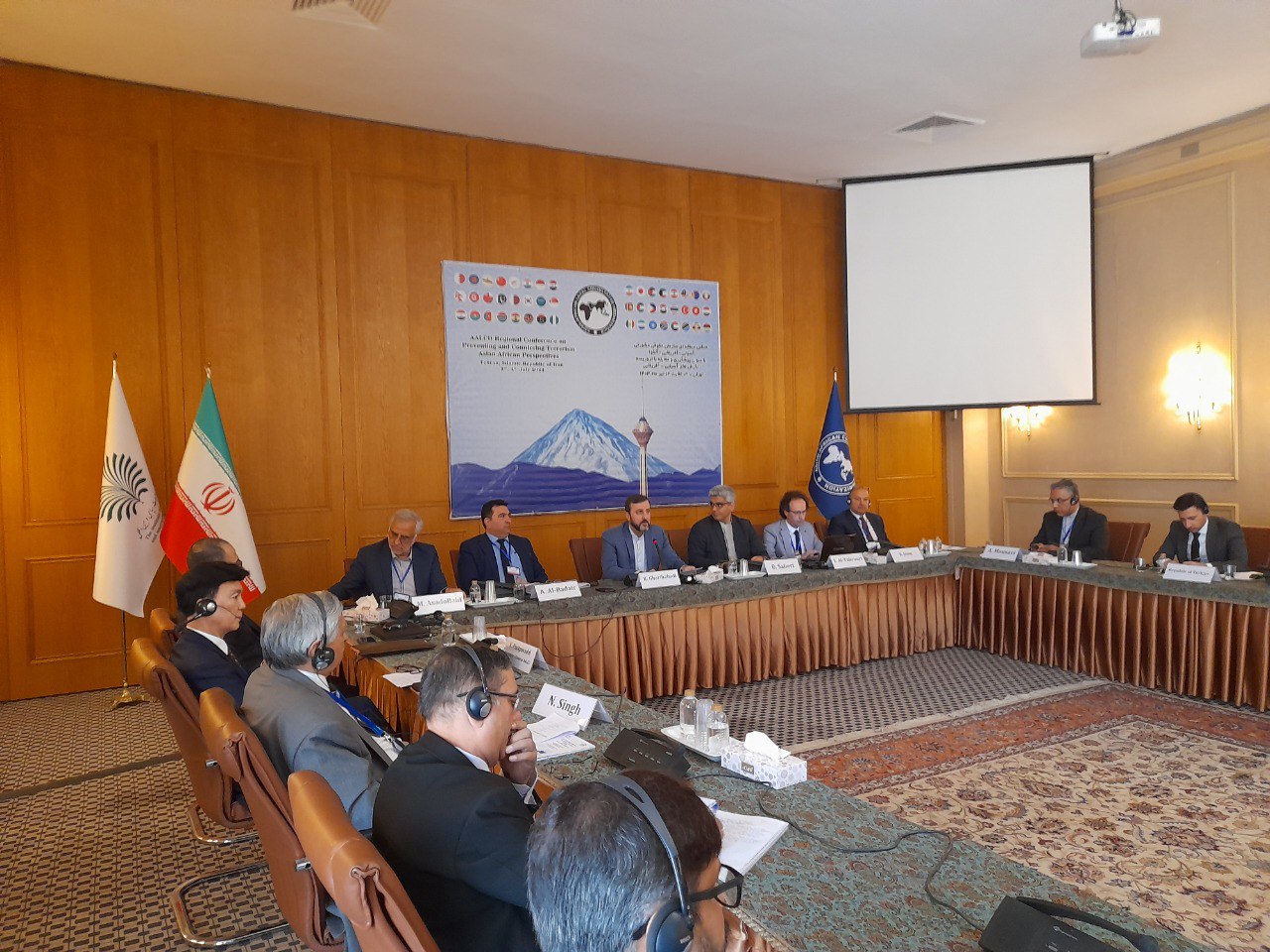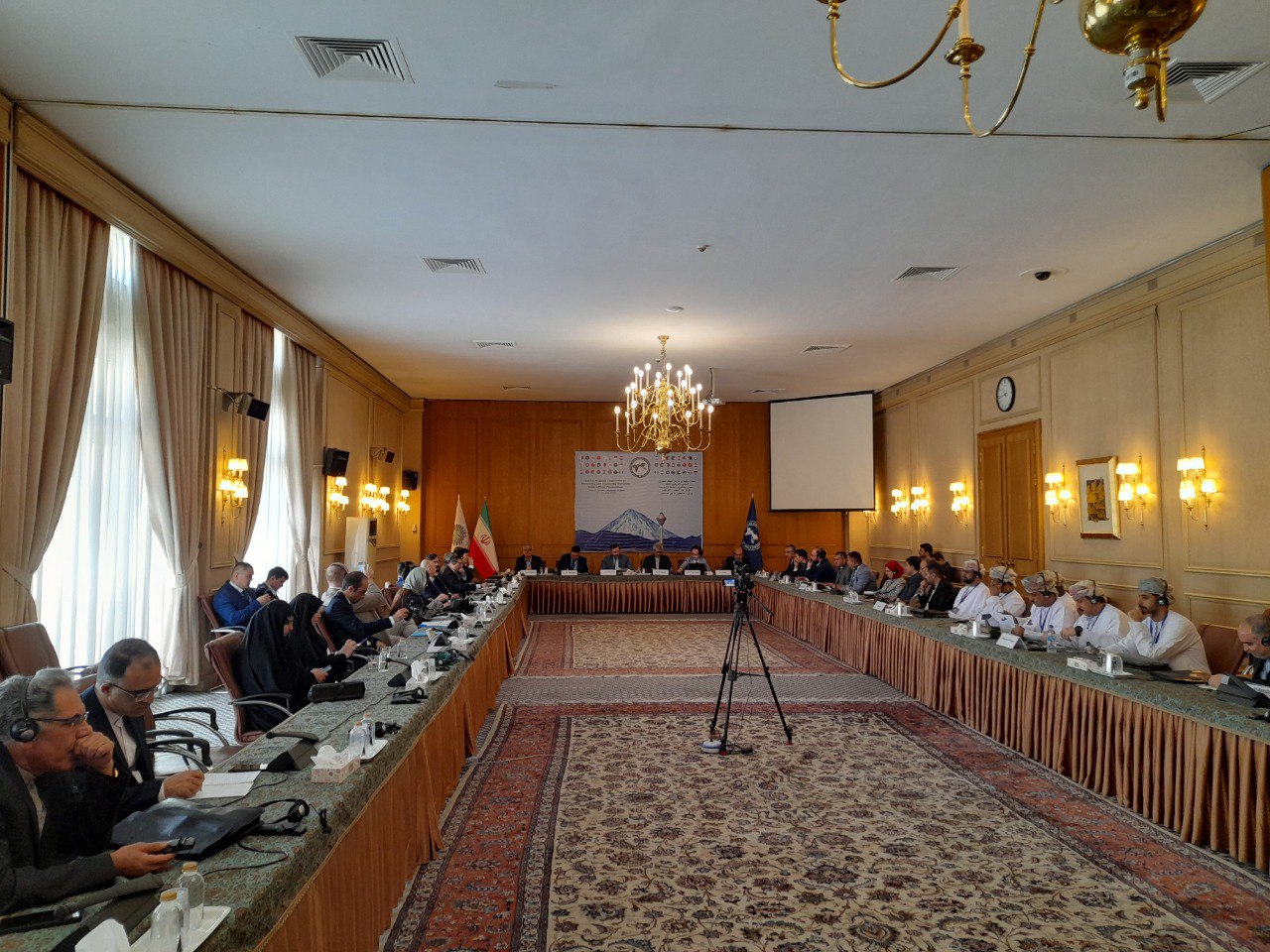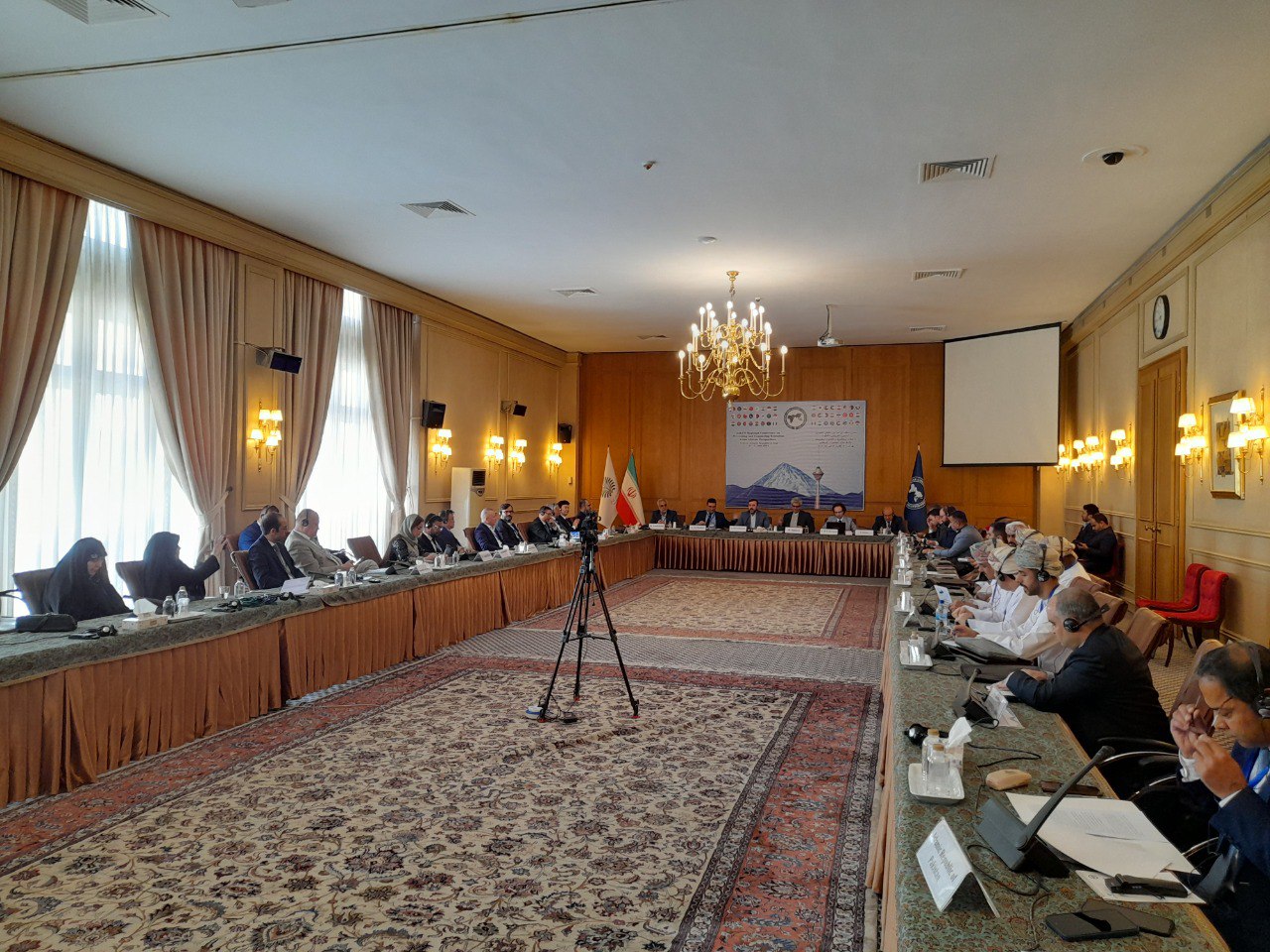In this meeting, while considering terrorism as a serious threat to international peace and security, Kazem Gharibabadi stated: “Since the adoption of the Convention on the Prevention and Punishment of Terrorism by the League of Nations in 1937, countering terrorism is under the order of the international community and as a result, the international community is continuously compiling international documents in this regard”.
He added: “The efforts of the international community, especially within the framework of the United Nations in this regard, indicate that terrorism is a completely complex global phenomenon that has different political, security, cultural, economic and social dimensions and is not limited to a single government or region. Terrorists are mobile and cross the real and virtual borders of different countries”.

The necessity of strengthening international judicial cooperation to stand against terrorism
The Secretary General of the HCHR further stated that terrorism knows no borders and emphasized: “Due to the development and globalization of terrorism, it is necessary to develop and strengthen the necessary tools to prevent and punish the perpetrators of terrorist crimes. Pursuing and investigating the perpetrators of these crimes is a difficult task. It is even more difficult when the accused, the victim, the causes of the crime, the witnesses and the proceeds of the crime are outside the jurisdiction of the place where the crime was committed. As a result, it is necessary to strengthen regional and international judicial cooperation to fight terrorism”.
Basic principles for international judicial cooperation in dealing with terrorism
Gharibabadi added: “The first basic principle for international judicial cooperation in dealing with terrorism is the criminalization of terrorism. In the criminal laws of the Islamic Republic of Iran, various forms of terrorism and financing of terrorism are defined. The Judiciary of the Islamic Republic of Iran, which is responsible for preparing judicial bills, has drafted the anti-terrorism bill and its final stages are being completed. This bill is considered a comprehensive bill and it has been prepared based on domestic needs and attention to binding international documents in the field of fighting terrorism”.
Referring to the five categories of terrorist crimes criminalized in this bill, the Secretary General noted: “Crimes related to the financing of terrorism; crimes related to the status of victims; crimes related to domestic aircraft; Crimes related to ships and fixed platforms and crimes related to dangerous substances are the crimes defined in this bill”.
Referring to the legal bases for cooperation as the second basic principle for international judicial cooperation, Gharibabadi stated: “The bases for judicial cooperation that specify various forms such as the extradition of criminals and judicial cooperation in criminal matters, include bilateral agreements, international conventions, and reciprocity.

International anti-terrorism conventions
The Secretary General of the HCHR noted: “The Islamic Republic of Iran is a member of several international anti-terrorism conventions, in which there are provisions for judicial cooperation in connection with terrorist crimes and extradition of criminals. Considering that these conventions have become domestic law, they are used as the basis of international judicial cooperation of the Islamic Republic of Iran in dealing with terrorism. Among these conventions are the Convention on the Prevention and Punishment of Crimes against Internationally Protected Persons, including Political Agents (1973) and the Convention on Preventing Illegal Acts against Civil Aviation Security (1971), the Organization of Islamic Cooperation Convention to Combat International Terrorism, the Convention on Combating the Financing of Terrorism”.
Bilateral treaties and the principle of reciprocity to fight terrorism
Gharibabadi further reminded: “The Islamic Republic of Iran has also concluded numerous bilateral agreements in the field of extradition of criminals and judicial cooperation in criminal matters with other countries, based on which it can cooperate with the countries that are parties to these agreements. In addition to bilateral conventions and agreements, the Judiciary of the Islamic Republic of Iran, according to the Judicial Cooperation Law approved in 1930, can cooperate judicially with other countries with whom there is no treaty-based cooperation, on the condition of mutual agreement regarding the fight against terrorism.”
Specific bilateral or multilateral arrangements to combat terrorism
The Vice President of the Judiciary for International Affairs added: “Considering that the Islamic Republic of Iran and some other countries, including the countries of the region, are victims of terrorism, the Judiciary of the Islamic Republic of Iran, with a new initiative within the framework of internal laws and existing agreements, by signing a memorandum of understanding, have established joint judicial committees to deal with terrorism bilaterally and trilaterally with the judicial systems of Iraq and Syria.
Based on these memorandum of understandings, the necessary measures to implement the request for judicial assistance are carried out immediately in special and common cases between the parties, and through the exchange of experiences, the parties of judicial cooperation carry out the documentation of committed terrorist crimes, the prosecution and punishment of the agents of terrorist groups, and the defense of the rights of victims in national and international courts. They deal with requests for the extradition of perpetrators of terrorist crimes with seriousness and urgency and accelerate their extradition to deal with impunity. In this framework, the Judiciary of the Islamic Republic of Iran is ready to develop and deepen judicial cooperation in dealing with terrorism with other countries affected by terrorist acts”.
Judicial cooperation within the framework of regional organizations
Gharibabadi continued: “The Islamic Republic of Iran is a member of some regional and extra-regional arrangements, and the capacity of these organizations is well used for judicial confrontation with terrorists. ECO is an economic cooperation organization whose founders, namely Iran, Turkey and Pakistan, established it with economic goals, and now it has 10 member states and has a population of more than 500 million, and the area of ECO member states is 8 million square kilometers. Due to the occurrence of some crimes in the geography covered by ECO, including terrorism, ECO members realized that they need judicial cooperation in order to achieve their commitments in the field of economic prosperity. Therefore, according to the role of the attorney generals of the member states, the first meeting of the ECO prosecutors on the topic of fighting terrorism and organized crime was held in Tehran at the initiative of the Islamic Republic of Iran, and so far the attorney Generals of the ECO member states have held 5 meetings.
He said: “The main goal of this meeting is to stand against terrorism and extremism as well as organized crimes, and usually, the General Prosecutors cooperate with each other through the exchange of information and experiences and the review of the latest developments related to the fight against terrorism and they directly exchange and follow up requests for judicial cooperation.
Noting that the environment has always been one of the targets of terrorists, the Secretary General of the High Council for Human Rights stated: “Environmental terrorism includes one or more illegal behaviors that, in addition to harming the environment, have the direct purpose of creating terror among people and threats to the security of countries. General Prosecutors of the coastal countries of the Caspian Sea (Islamic Republic of Iran, Republic of Azerbaijan, Republic of Kazakhstan, Russian Federation and Turkmenistan) have held two meetings in the last two years with the aim of preserving the environmental security of the Caspian Sea and protecting living resources. The judicial authorities of these countries cooperate in the field of environmental protection and the use of natural resources of the Caspian Sea”.
He continued: “In these collaborations, while discussing the issue of fighting the pollution of the Caspian Sea, experiences and judicial information of the coastal countries in the field of fighting environmental crimes of the Caspian Sea, which can have terrorist motives, will be shared. At the end of the meeting, declarations are issued that provide the basis for judicial cooperation in relation to environmental crimes within the framework of domestic laws and regulations”.

The three main goals of the Shanghai Cooperation Organization to fight terrorism
Regarding the important role of the Shanghai Cooperation Organization, Gharibabadi said: “The Shanghai Cooperation Organization was established in 2001 with the three main goals of fighting terrorism, separatism and extremism. 9 members of the organization include China, Russia, Uzbekistan, Tajikistan, Kyrgyzstan, India, Pakistan and the Islamic Republic of Iran. The geographical situation of this organization is more than 35 million square kilometers or three fifths of Eurasia”.
The population covered by its main members and supervisors is more than 3.4 billion people, equivalent to more than 42% of the world's population. 49 documents regulate the relations and cooperation of the members of this organization. The main documents of this organization specifically address the issue of counter-terrorism, including the Shanghai Convention on Countering Terrorism, Separatism and Extremism; Additional Document of Amendments to the Shanghai Treaty in the Field of Combating Terrorism; The Agreement of the Member States of the Shanghai Cooperation Organization on the Regional Anti-terrorism Structure and two supplementary documents; and the Shanghai Cooperation Organization Treaty against Terrorism. The judicial authorities of the organization's member states at different levels annually hold various summits in order to achieve its main goals, which is the fight against terrorism and extremism”.
Gharibabadi clarified: “These officials include heads of judicial systems, general prosecutors and even judges of local courts. In these summits, the deepening and concentration of judicial cooperation between judicial institutions within the framework of the Shanghai Organization and the establishment of a complete consensus in the field of the full realization of the organization's goals, including the fight against terrorism, are usually emphasized. In addition, within the framework of the organization's main agreements, documents and memoranda of understanding are drawn up to provide judicial cooperation in the fight against terrorism and extremism. Decisions made in the framework of the Shanghai Cooperation Organization are made by consensus”.
The Vice President of the Judiciary for International Affairs added: “The BRICS group with its 9 members (Brazil, Russia, Islamic Republic of Iran, India, China, South Africa, Egypt, Ethiopia and the United Arab Emirates) is also a trans-regional group with the presence of emerging economic powers. The Islamic Republic of Iran became a member of the BRICS group on August 24, 2023. BRICS members have also come to the conclusion that facilitating economic relations requires judicial cooperation between members. Terrorism is a destructive factor in economic activities. The prosecutors of the BRICS member states, as the highest authorities fighting crime and terrorism, have held six meetings so far in order to develop judicial cooperation. These gatherings have provided the basis for the exchange of experiences and judicial cooperation through bilateral and multilateral meetings, as well as the preparation of documents.
He continued: “In the last meeting of the Prosecutors Generals of the BRICS member countries, which was held on June 18 and 19, 2024, new challenges and threats in cyberspace were discussed. One of the serious and dangerous threats, currently, is cyber terrorism. In this connection, in the final document of the recent meeting, important issues were discussed for judicial cooperation. Exchanging information and experiences, holding video conference meetings, designing and developing judicial cooperation between prosecutors are among the examples of judicial cooperation within the framework of prosecutors general of BRICS member countries. The development of such judicial cooperation is definitely effective in the group fight against terrorism, and the judiciary of the Islamic Republic of Iran welcomes it”.
Iran is a great victim of terrorism
The Secretary General of the HCHR emphasized: “The Islamic Republic of Iran is a great victim of terrorism. During the last four decades, more than 25 thousand innocent people have been martyred by various terrorist groups. Many perpetrators of these terrorist crimes now live in Western countries. In this regard, two important examples can be mentioned that despite the legal basis for judicial cooperation and the extradition of criminals, these countries do not fulfill their obligations. The first example is the members of the terrorist group of the Monafeqeen (the Hypocrites), who martyred more than 17000 innocent people, including women and children, and the other example is the terrorist act of Baghdad airport in martyring the General Hajj Qassem Soleimani, the hero in fighting against terrorism”.
Gharibabadi added: “Martyr General Soleimani was one of the internationally supported persons who was assassinated by the then U.S. authorities and on the order of the then president of this country. However, despite being a member of the 1973 Convention, the U.S. has not fulfilled any of its obligations to extradite or prosecute those accused of this terrorist crime. But I would like to inform you that the Judiciary of the Islamic Republic of Iran has filed a court case for both groups and the process of judicial review of the charges against the criminals is ongoing. In addition, extradition requests for more than 100 terrorists belonging to different groups have been sent to some countries. Iran will not allow terrorists to move freely in the safe heaven of the host countries and lead or commit their terrorist operations. We will use all our capacities to deal with the impunity of terrorists, and in this field, we welcome having cooperation with any interested country”.
At the end, Gharibabadi proposed to hold a meeting of ALCO judicial officials to deal with terrorism and organized crimes and other topics of interest.